Unpacking Your Fear PTSD Worksheet
Assess how fear impacts your patients with PTSD using the Unpacking Your Fear PTSD Worksheet!


What are trauma and PTSD?
When we speak of trauma in this guide, we’re referring to mental trauma, which is the intense and severe psychological and emotional scars people end up sustaining after going through an experience considered harrowing, horrifying, overwhelming, and/or violating.
Being sexually harassed and assaulted counts as that kind of an experience. Other examples include losing a family to a plane crash, losing your home to a natural disaster or fire, being a victim of a racist hate crime, home invasions, and participating in wars.
The mental scars these events leave in their wake make it difficult for the traumatized to cope and work through them. It can even gradually destroy their overall mental health if left unchecked because memories, senses, and being close to where the traumatizing situations/experiences took place can trigger these scars.
Traumatized people will likely have Post-Traumatic Stress Disorder, or PTSD for short. This is a complex mental health condition that is characterized by a wide variety of symptoms. Here are examples of PTSD symptoms they might have:
- Hypervigilance
- The tendency to avoid people, things, and places
- Depression (sometimes severe)
- Anxiety (sometimes severe)
- Emotional outbursts
- Irritability
- Disassociation
- Difficulty sleeping
- Difficulty concentrating
- Losing interest in doing things
- Self-harming/suicidal thoughts
They will also feel a variety of emotions as a result, such as fear, anger, spite, guilt, shame, and more.
Working through trauma requires people to confront and cope with PTSD symptoms and triggers healthily. However, that’s easier said than done.
Unpacking Your Fear PTSD Worksheet Template
Unpacking Your Fear PTSD Worksheet Example
How to use the Unpacking Your Fear PTSD Worksheet:
If you’re a psychotherapist or a similar mental healthcare professional, it shouldn’t be surprising if you have difficulty motivating someone to discuss and confront their trauma. It’s best to take it slow and go at a comfortable pace for your patients so they don’t get overwhelmed by something that likely overwhelms them daily.
In the case of this guide, PTSD-related fear is the emotion that will be tackled, and the Unpacking Your Fear PTSD Worksheet will allow patients to take a step back and examine their fear. Examining this feeling (including others) will help make them more aware of how PTSD-related fear has affected their lives, worldviews, perspectives, responses, behaviors, and relationships.
Using the Unpacking Your Fear PTSD Worksheet is easy! All a patient needs to do is answer the following prompts/guide questions:
- Describe the feeling or feelings of fear that you remember. What were the situations that made you feel fear?
- What did you do in those situations? What did you think about? How did you act?
- Did these thoughts and actions motivate you to confront your feelings of fear? If so, how?
- Can you notice if other people feel fear? If so, what do you do about what you’ve noticed?
- How do your fears affect your relationships?
- OPTIONAL: Do you have coping strategies for your PTSD-related fears? If so, what are they? It’s okay if you don’t have any as of now. We’ll work together to help you cope.
For those issuing this worksheet, please remind your patients to write descriptively.
When is it best to use the Unpacking Your Fear PTSD Worksheet?
For psychotherapists and similar mental healthcare professionals, the best time to issue the Unpacking Your Fear PTSD Worksheet to a patient would be during the early stages of your therapy or counseling programs. These would be when you’re still getting to know your patients and their traumas, especially their feelings and how they respond to their PTSD triggers.
This worksheet is best used during these stages because the questions are meant to get your patients to discuss and state what makes them fearful, especially when considering their trauma and PTSD triggers. Not only that, but the worksheet will nudge them to examine what they think about and do whenever they fear something and how their fears affect their relationships.
For non-mental healthcare professionals who stumbled on this guide, we’re happy to inform you that you can use this worksheet anytime! Our template for Unpacking Your Fear PTSD Worksheet is free, so you can download it anytime and use it when needed.
We’re aware that PTSD can overwhelm anyone to the point that a person may no longer have the energy or the emotional capacity to think about their PTSD-related fears properly, and that’s understandable! This worksheet should assist with framing what you want to say about your fears, so keep a copy of the worksheet in your bag or mobile device so you can answer it when you feel the time is right.
What are the Benefits of Using the Unpacking Your Fear PTSD Worksheet?
The Unpacking Your Fear PTSD Worksheet is an inexpensive tool to have.
This worksheet (or any worksheet) is helpful and doesn’t cost much. If you’re the type of mental healthcare professional who likes having printouts of worksheets, then you will just spend on printing copies of this worksheet. If you’ve gone paperless with your practice, it won’t cost you anything because you can just send empty PDF copies to your patients with PTSD.
The worksheet also doesn’t require anything special from professionals and patients. People engaging with the sheet must only answer the prompts and questions.
The worksheet can help professionals identify their patients’ fears.
The great thing about this worksheet is that patients can discuss their fears in light of their trauma and PTSD. Doing so will help psychotherapists and similar professionals understand what fears have sprung forth due to their patients’ traumas, what caused these fears to emerge in the first place, how their patients cope with their fears, and how they have affected their relationships.
Patient answers can help professionals think of relevant follow-up questions that elicit more nuanced responses. The more information professionals have, the more perspectives they can consider when developing their patient treatment plans.
The Unpacking Your Fear PTSD Worksheet works better if other PTSD worksheets are used.
Fear is not the only emotion patients with PTSD have to deal with. As mentioned earlier, PTSD is complex and is characterized by numerous symptoms and emotions. They will likely feel anger, anxiety, despair, shame, spite, etc.
Other PTSD worksheets similar to the Unpacking Your Fear worksheet should help professionals examine other PTSD-related emotions to uncover the nuances of each patient’s trauma. A nuanced understanding of a patient’s trauma and PTSD will help professionals better tackle their patients’ traumas and related problems.
Leveraging the PTSD worksheet template and unpacking your disappointment worksheet template can bolster your practice and client progress. This tool ensures a thorough assessment of PTSD impacts.
Commonly asked questions
It’s easy to conflate anxiety and fear as they are closely related, but fear pertains to what you are afraid of and feel when you perceive or are in danger. On the other hand, anxiety pertains to the inner turmoil that revolves around your worries, especially ones that stem from your fears. So, this worksheet focuses on what you’re afraid of when in danger, while Unpacking Your Anxiety focuses on the distress you feel when thinking about something you perceive, something you’re anticipating (that might not even happen), or something imagined.
If we’re basing this on the instructions, it is not difficult. Whatever difficulty your patients encounter will come from their PTSD and how comfortable they are discussing their fears concerning their trauma. Trauma is a touchy subject, after all, so it’s best to make them feel like they’re in a safe and non-judgmental space.
Here are other examples of PTSD worksheets you can use alongside Unpacking Your Fear:
- Unpacking Your Anger
- Unpacking Your Despair and Hopelessness
- Unpacking Your Guilt
- Unpacking Your Shame
- Unpacking Your Spite
We even have ones for positive emotions/feelings like the following:
- Unpacking Your Empathy
- Unpacking Your Gratitude
- Unpacking Your Happiness
- Unpacking Your Pride
We have downloadable templates for all of these!


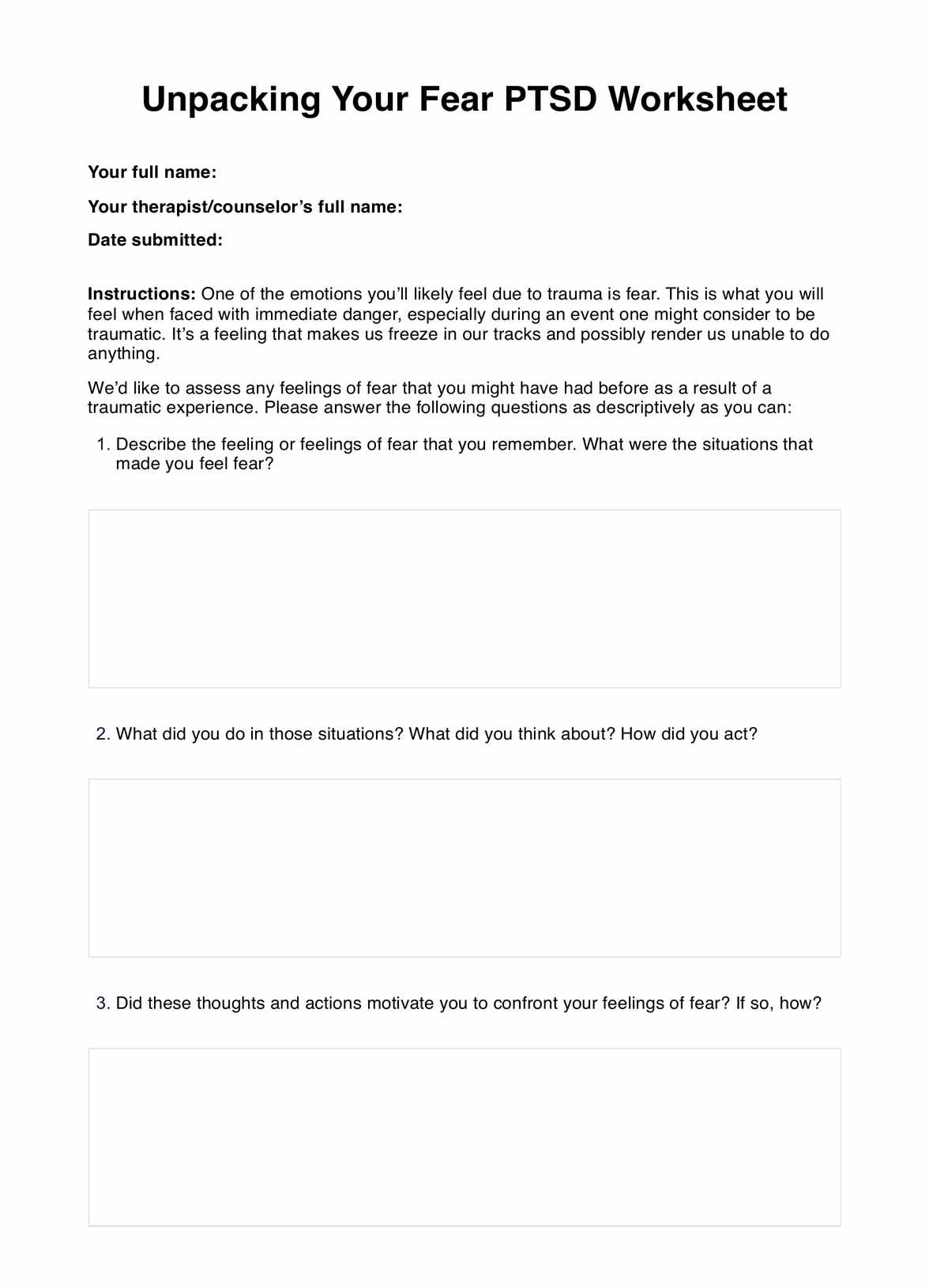
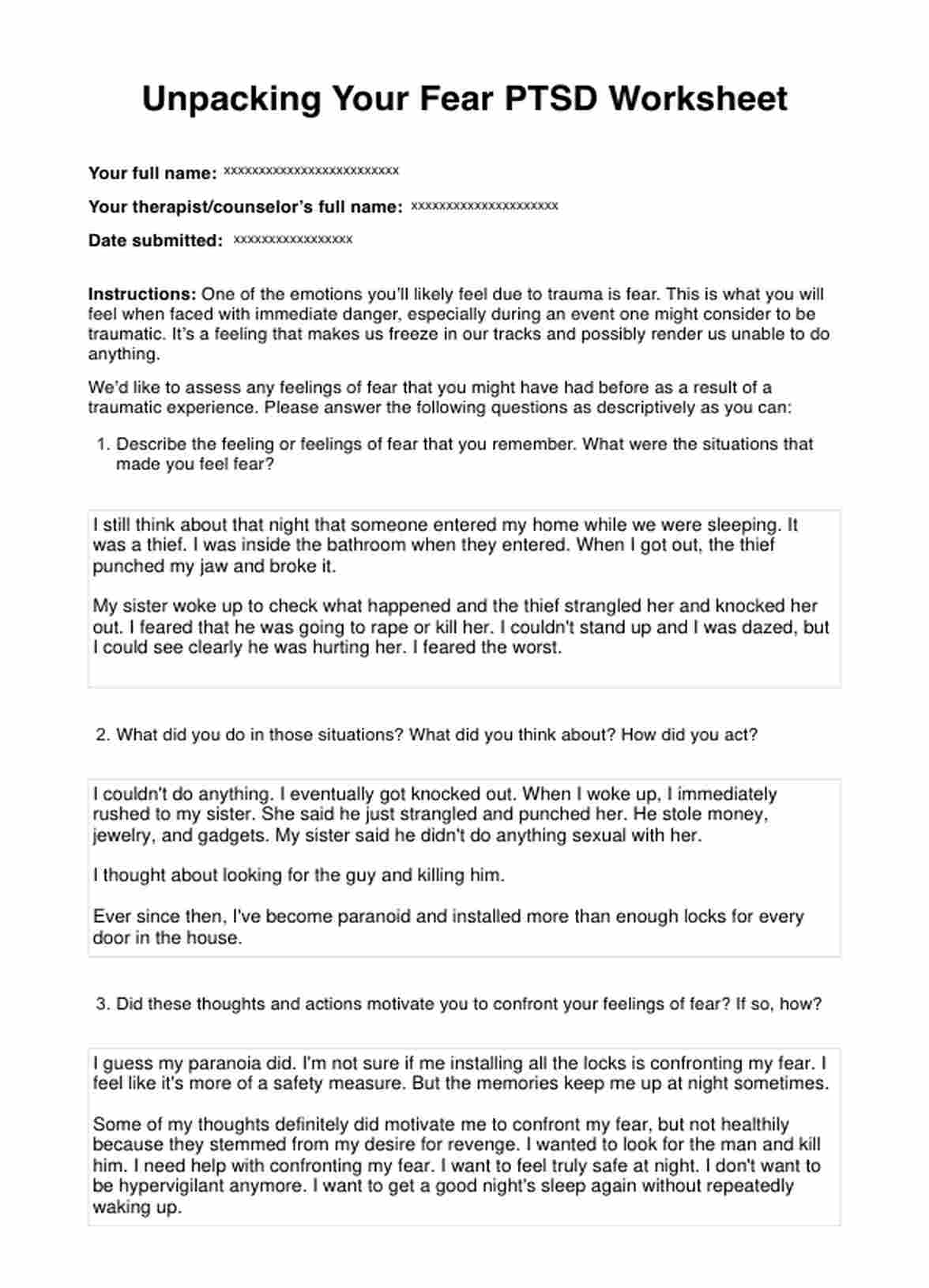

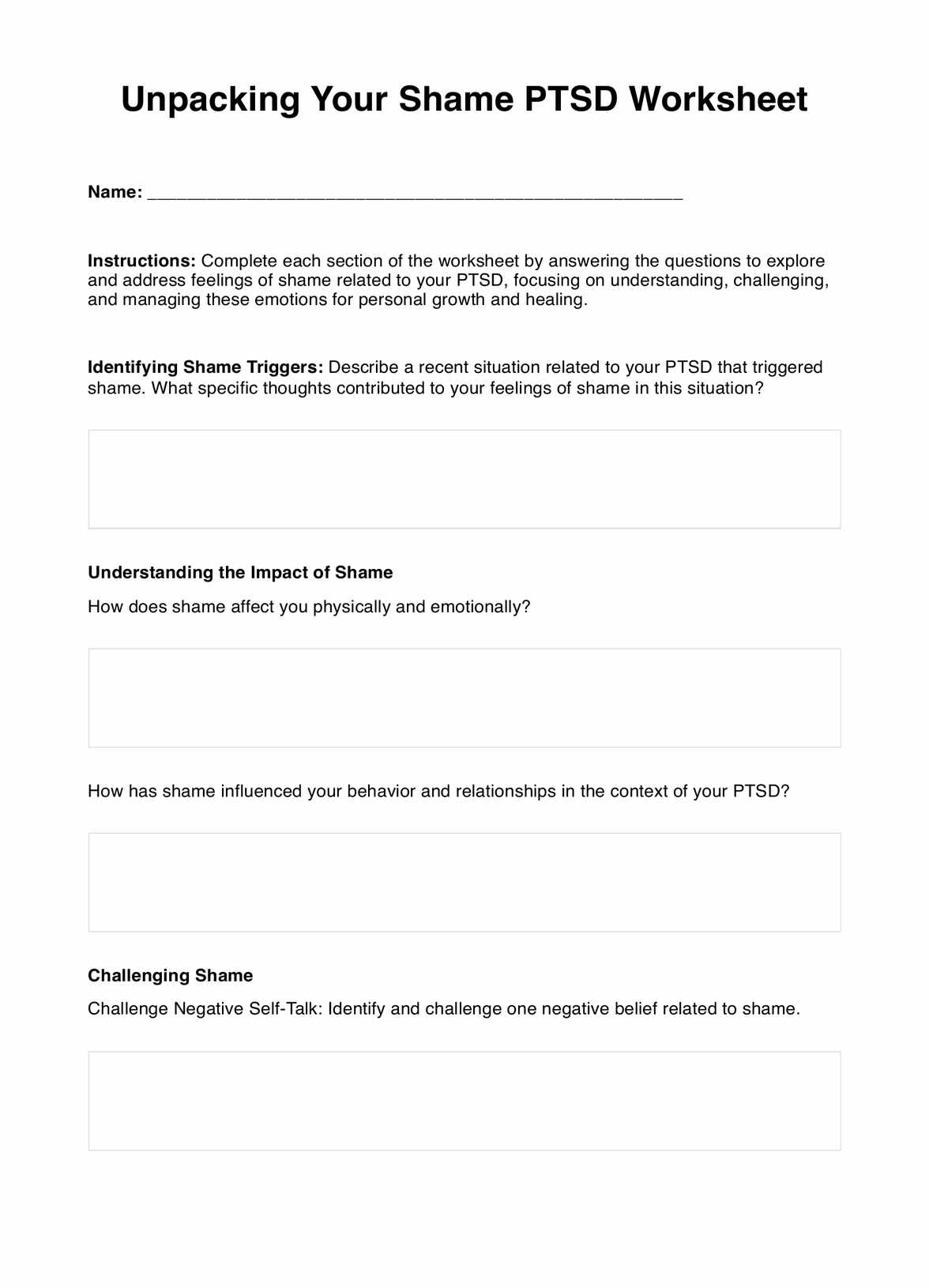
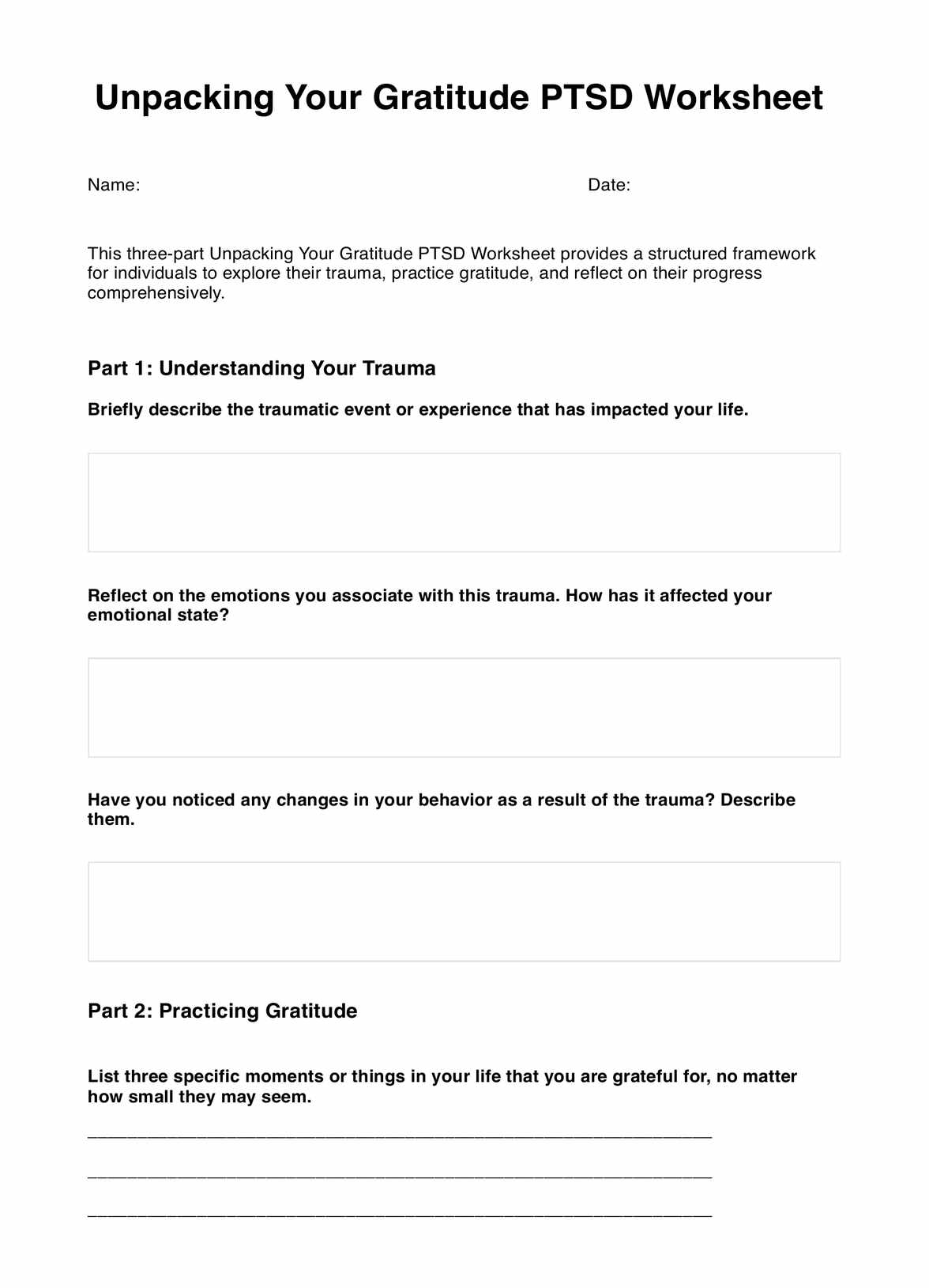
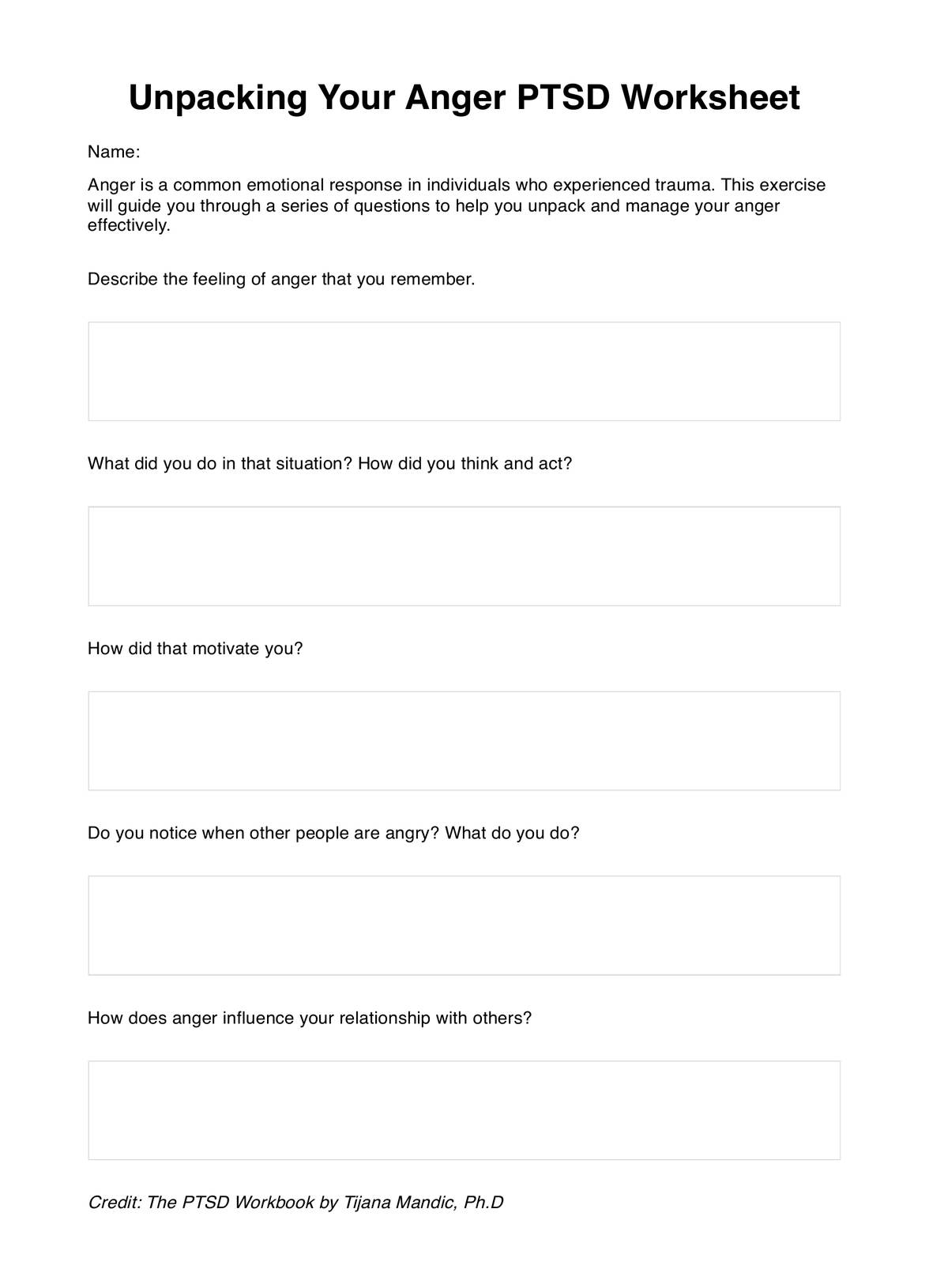

















-template.jpg)




















































































